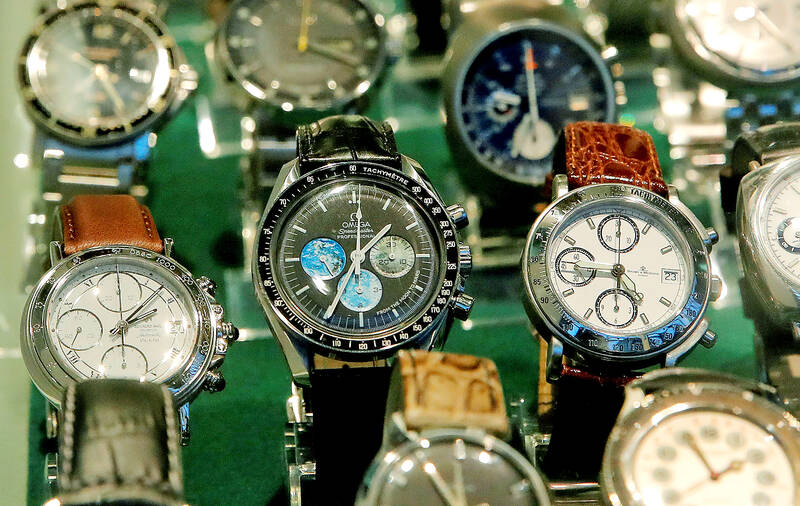Swiss watchmaker Omega SA said that three former employees were involved in a criminal plot that resulted in the sale of a faked Speedmaster at auction for more than US$3 million.
The timepiece, an Omega Speedmaster with “broad arrow” hands from 1957, was a “Frankenstein” watch, composed of an amalgam of mostly authentic parts from other vintage watches, the Biel, Switzerland-based company said in a statement in response to questions from Bloomberg.
The timepiece sold for just more than 3.1 million Swiss francs (US$3.42 million) through auctioneer Phillips in November 2021, the highest price paid for a Speedmaster at auction.

Photo: Reuters
The watch was purchased by Omega, the company said.
The scandal underscores concerns that forgers are creating fakes or altering some vintage watches sold on the secondary market and at auction to achieve higher sale prices. Collectors will pay millions for certain watches in good condition with original parts.
A former employee of the Omega Museum and its brand heritage department was among the staffers alleged to have participated, Omega said.
That former employee “worked in tandem with intermediaries to purchase the watch for the Omega Museum,” arguing to company executives that it “was a rare and exceptional timepiece that would be an absolute must” for Omega’s collection, the company said.
However, the watch was a sophisticated forgery, melding components from various timepieces as well as potentially fabricated parts, Omega said, adding that the former employees might have been involved in its assembly.
Omega did not identify the former employees it said participated in the scheme.
“Its false legacy allowed the profiteers to justify a highly inflated bid made through the intermediaries,” the watchmaker said.
The scheme was “to the massive detriment of Omega,” chief executive officer Raynald Aeschlimann told Swiss newspaper Neue Zurcher Zeitung, which first reported on the case and the accusations against the former employees.
An Omega spokesperson said the company does not yet know who brought the watch to Phillips to sell at auction.
A spokesperson for the auction house said it has not disclosed the identity of the seller due to client confidentiality rules, but would do so if asked by authorities such as the police or courts.
When Phillips consigned the watch and went to Omega for information from its archives, “we were not aware of the alleged criminal activity that is now the subject of an investigation,” the spokesperson added.
The auction house obtained confirmation from Omega of the date of manufacture of the numbered movement, its serial number, the model of the watch that the movement was fitted to and the date it was sold, its spokesperson said, adding that Phillips understands that representatives of Omega saw the watch before they purchased it.
Phillips said it is committed to the “highest standards and due diligence levels in the watch market,” and that the item in question had been viewed by collectors, academics and experts, and traveled to London, Singapore, Hong Kong and New York before it was auctioned in Geneva.
“If, having reviewed the evidence, we think there are grounds for criminal prosecution, then we will have no hesitation in referring the matter to the authorities to prosecute,” the spokesperson said.

Semiconductor shares in China surged yesterday after Reuters reported the US had ordered chipmaking giant Taiwan Semiconductor Manufacturing Co (TSMC, 台積電) to halt shipments of advanced chips to Chinese customers, which investors believe could accelerate Beijing’s self-reliance efforts. TSMC yesterday started to suspend shipments of certain sophisticated chips to some Chinese clients after receiving a letter from the US Department of Commerce imposing export restrictions on those products, Reuters reported on Sunday, citing an unnamed source. The US imposed export restrictions on TSMC’s 7-nanometer or more advanced designs, Reuters reported. Investors figured that would encourage authorities to support China’s industry and bought shares

FLEXIBLE: Taiwan can develop its own ground station equipment, and has highly competitive manufacturers and suppliers with diversified production, the MOEA said The Ministry of Economic Affairs (MOEA) yesterday disputed reports that suppliers to US-based Space Exploration Technologies Corp (SpaceX) had been asked to move production out of Taiwan. Reuters had reported on Tuesday last week that Elon Musk-owned SpaceX had asked their manufacturers to produce outside of Taiwan given geopolitical risks and that at least one Taiwanese supplier had been pushed to relocate production to Vietnam. SpaceX’s requests place a renewed focus on the contentious relationship Musk has had with Taiwan, especially after he said last year that Taiwan is an “integral part” of China, sparking sharp criticism from Taiwanese authorities. The ministry said

US President Joe Biden’s administration is racing to complete CHIPS and Science Act agreements with companies such as Intel Corp and Samsung Electronics Co, aiming to shore up one of its signature initiatives before US president-elect Donald Trump enters the White House. The US Department of Commerce has allocated more than 90 percent of the US$39 billion in grants under the act, a landmark law enacted in 2022 designed to rebuild the domestic chip industry. However, the agency has only announced one binding agreement so far. The next two months would prove critical for more than 20 companies still in the process

CHANGING JAPAN: Nvidia-powered AI services over cellular networks ‘will result in an artificial intelligence grid that runs across Japan,’ Nvidia’s Jensen Huang said Softbank Group Corp would be the first to build a supercomputer with chips using Nvidia Corp’s new Blackwell design, a demonstration of the Japanese company’s ambitions to catch up on artificial intelligence (AI). The group’s telecom unit, Softbank Corp, plans to build Japan’s most powerful AI supercomputer to support local services, it said. That computer would be based on Nvidia’s DGX B200 product, which combines computer processors with so-called AI accelerator chips. A follow-up effort will feature Grace Blackwell, a more advanced version, the company said. The announcement indicates that Softbank Group, which until early 2019 owned 4.9 percent of Nvidia, has secured a